May 28, 2025 | 09:02 GMT +7
May 28, 2025 | 09:02 GMT +7
Hotline: 0913.378.918
May 28, 2025 | 09:02 GMT +7
Hotline: 0913.378.918
Located on the poetic Dong Nai and Be rivers, the road to Tan My commune (Bac Tan Uyen district, Binh Duong) is covered with the green of citrus trees, most of which are orange-leaf sweet pomelo and green-skinned pomelo. The fate of pomelo trees growing on this land and the process of Tan My Fruit Tree Cooperative being born are both miserably hard and equally interesting journeys.
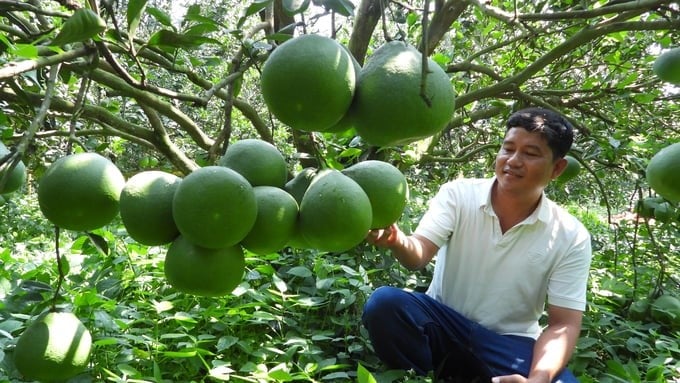
Mr. Sang's pomelo garden is produced according to GlobalGAP standards and exported to Europe. Photo: Tran Phi.
According to the local agricultural sector, Tan My Fruit Tree Cooperative is one of the bright spots for high-tech application to crop production in Bac Tan Uyen district. Thanks to being in the right direction, being dynamic, and mastering technology, many products of the Cooperative have been certified as provincial-level OCOP with high rankings; typically, green-skinned pomelo achieved 4 stars, orange-leaf sweet pomelo achieved 3 stars, and cantaloupe reached 3 stars.
At the end of January 2024, over 100 tons of pomelo from Tan My Fruit Tree Cooperative were exported to the Netherlands, paving the way for Vietnamese pomelo to go to Europe. This is exactly the motivation for pomelo growers in Bac Tan Uyen to build their brand, focus on improving standards of quality and food safety, and form a specialized organic pomelo growing area for export, helping the land of War Zone D in the past gradually change.
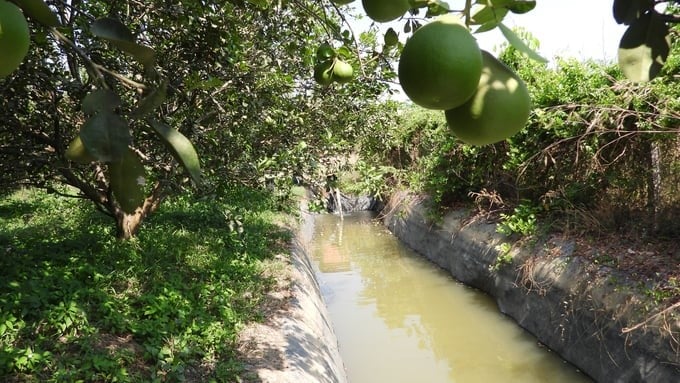
To ensure water for production, Mr. Sang invested in a storage pond system combined with an advanced irrigation system. Photo: Tran Trung.
Leading us to visit the fruit-laden pomelo garden preparing for the 2nd session of exports to Europe, Mr. Le Minh Sang, Director of Tan My Fruit Tree Cooperative, said that Bac Tan Uyen used to be considered the capital of industrial trees in Binh Duong province. In the 2000s, the wave of migration from the Southwest to settle here brought green-skin pomelo, along with the introduction of orange-leaf sweet pomelo from Dong Nai. In 2003, although rubber was in its heyday, Mr. Sang decided to convert his family's rubber land to growing pomelo. However, unlike the productivity-based farming style, Mr. Sang chose to follow the nature-based farming style, which is the foundation for the Cooperative's pomelo today.
According to Mr. Sang, in 2015, when pomelo faced many difficulties due to surplus goods and pomelo growers were still blind to safe agriculture, the Cooperative's pomelo achieved VietGAP certification and was present in most large and small supermarket systems nationwide with a stable price of over VND 30,000/kg, bringing an income of billions of dong.
Talking about the secret to achieving this success soon, Mr. Sang said that producing according to VietGAP or even GlobalGAP standards, as the Cooperative is doing, is not difficult. However, the difficulty is that most of the products produced are not eye-catching. The Cooperative must try to convince customers that "goodness is better than beauty." Thanks to persistence, more and more customers know about the Cooperative's pomelo, and the market is increasingly open.
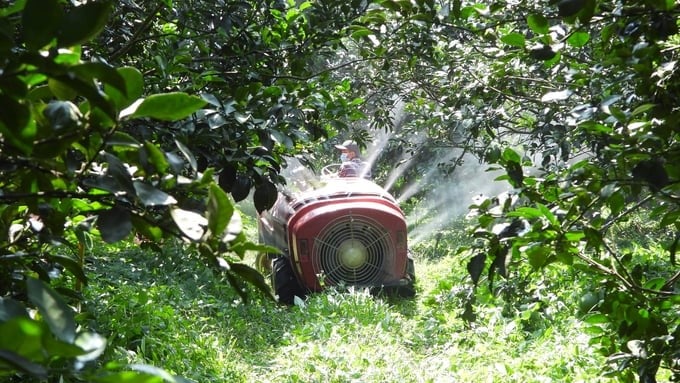
The Cooperative also pays attention to investing in advanced and modern equipment, contributing to increasing both the productivity and quality of pomelo. Photo: Tran Trung.
"In the first years of growing pomelo, because we could not afford to buy a pump, everyone had to take turns carrying water from the ditch near the garden to water each tree. Many people were doubtful about giving up rubber to plant pomelo; many even think I'm mentally ill. However, when rubber prices went down, they started coming to me to learn. Seeing with their own eyes the lush, fruit-laden garden with high economic efficiency, the neighbors gradually changed their thinking," said Mr. Sang.
Thanks to the alluvium and mineral-filled water of the Be and Dong Nai rivers, pomelo grown in Tan My has a very special flavor compared to types of pomelo grown in other areas, with round, succulent segments and soft, fresh-sweet pomelo cloves, so traders purchase it at a higher price than pomelo of the same type on the market.
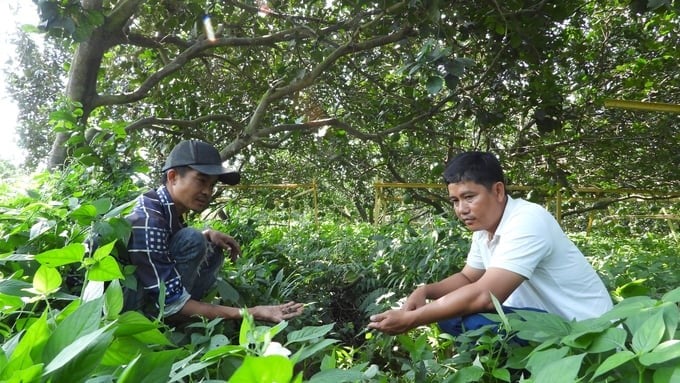
Producing according to the nature-based philosophy helps the soil be healthy, trees grow well, resist pests and diseases well, and have stable productivity. Photo: Tran Trung.
To produce safe, quality pomelo fruits, Tan My Fruit Tree Cooperative constantly applies advanced techniques and the most scientific planting methods. Accordingly, the Cooperative plans and builds a garden, combining soil reclamation, plot design, and an automatic irrigation system. At the same time, implement scientific processes, combining practical experience and advanced models of developed countries such as the US and Israel.
"Growing pomelo in a nature-based direction in general and according to VietGAP and GlobalGAP standards in particular is not only beneficial for the health and safety of producers but also improves the product quality. Instead of using chemical products, stimulants, and pesticides, the Cooperative uses composted manure and microbial products.
To create a favorable environment for beneficial insects to live, regulate, and balance the ecology in the garden, weeds are kept. When necessary, only manual methods are used to prune, and absolutely no herbicides are used. Over time, the grass decomposes to form an organic humus layer, which is very good for the trees and takes less effort to fertilize, while the trees are still healthy, the fruits are delicious, and the environment is clean," Mr. Sang shared his experience.
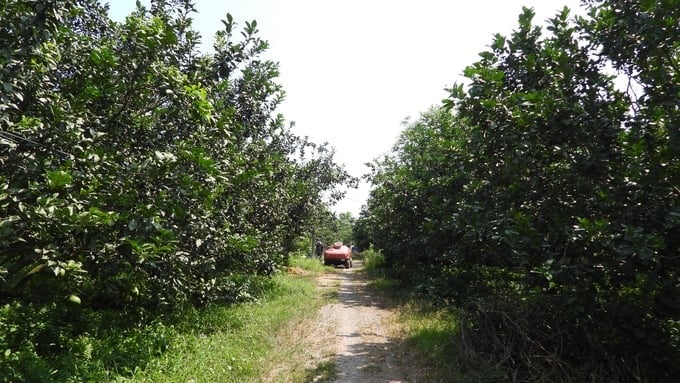
Tan My Fruit Tree Cooperative currently has 20 hectares of pomelo produced according to GlobalGAP standards, qualified for export to European markets and some Southeast Asian countries. Photo: Tran Phi.
The Cooperative currently has 62 hectares of green-skinned pomelo and orange-leaf sweet pomelo, of which 20 hectares are produced according to GlobalGAP standards and qualified for export to the European market and some Southeast Asian countries. In addition, the remaining areas that meet VietGAP standards are supplied to supermarket systems and clean food store chains nationwide.
"The export price of pomelo is about 30% higher than the selling price in the domestic market. This is the joy and pride of the cooperative members in particular and Tan My commune in general when the homeland’s typical products have been brought to foreign markets. Currently, the Cooperative is aiming at 100% of the pomelo area meeting GlobalGAP standards to target the potential European market," Mr. Sang expressed his excitement.
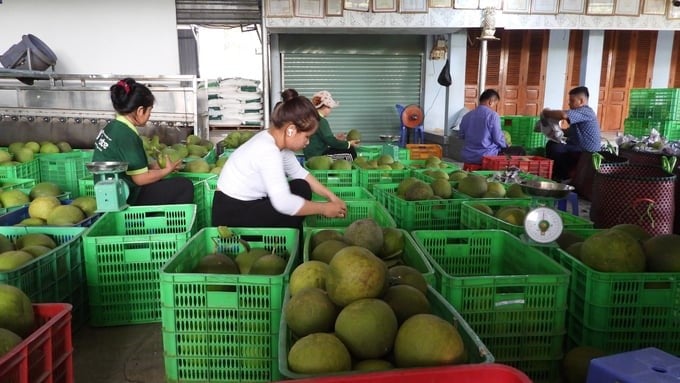
Tan My Fruit Tree Cooperative prepares pomelo for export to the Netherlands for the 2nd session. Photo: Tran Trung.
Mr. Nguyen Hoang Quoc Viet, Head of the Economics Department of Bac Tan Uyen District, said that the entire district currently has 15 cooperatives operating stably in many fields such as agriculture, trade, services, transportation, construction, and manufacturing. Of which, the stamp of citrus tree growing cooperatives can be clearly seen. Tan My Fruit Cooperative is one of the most advanced examples of a model of cooperative economics and agricultural production applying modern techniques and technology with high efficiency.
"In order for citrus trees to develop fundamentally in the coming time, the district continues to develop and implement planning for specialized growing areas for citrus trees; invest in and develop agricultural, transportation, irrigation, electricity, and trade infrastructure; and actively disseminate and bring agricultural support policies and guidelines to farmers.
Besides, the district also actively implements topics and projects to support the development and care of output for citrus fruit products; promote trade promotion activities; organize seminars on solutions to improve product quality; and expand citrus fruit consumption markets in the district," said Mr. Nguyen Hoang Quoc Viet, Head of the Economics Department at Bac Tan Uyen District Health.
Translated by Thu Huyen

(VAN) FAO’s Director-General addresses the 5th Baghdad International Water Conference.
/2025/05/26/1716-4-nongnghiep-191706.jpg)
(VAN) Chain linkages, technological innovation, and raw material zoning are three strategic pillars for the coconut industry to strongly develop and elevate its position on the global agricultural map.
![Advanced mariculture – an inevitable trend: [4] Accompanied by scientists](https://t.ex-cdn.com/nongnghiepmoitruong.vn/608w/files/sohk/2025/05/13/1941-pgsts-vo-van-nha-140958_717.jpg)
(VAN) According to Assoc. Prof. Dr. Vo Van Nha, Director of the RIA III, the development of advanced offshore mariculture is no longer an option but an essential path for Vietnam’s fisheries sector.

(VAN) Vietnam is intensifying the development of mollusk farming areas that meet international standards, aiming for sustainable growth and enhancing its export position in the global seafood market.
![Advanced mariculture – an inevitable trend: [3] Policy-driven momentum](https://t.ex-cdn.com/nongnghiepmoitruong.vn/608w/files/doanhtq/2025/05/21/0104-0616-0348-nuoi-bien-170339_789.jpg)
(VAN) To ensure the success of offshore mariculture that uses advanced technologies, it is essential to establish supportive policies that inspire both individuals and enterprises to invest with confidence.
![Advanced mariculture – an inevitable trend: [2] Outstanding results](https://t.ex-cdn.com/nongnghiepmoitruong.vn/608w/files/sohk/2025/05/12/4632-4136-nuoi-bien-11-164117_819.jpg)
(VAN) Pilot models of high-tech offshore mariculture in Vietnam, particularly in the South Central Coast region, have demonstrated exceptional economic returns and sustainability, setting a new direction for the country’s aquaculture industry.
![Advanced mariculture – an inevitable trend: [1] Moving offshore](https://t.ex-cdn.com/nongnghiepmoitruong.vn/608w/files/phucpm/2025/05/18/0252-2436-nuoi-bien-6-162148_783.jpg)
(VAN) Mariculture using advanced technology and moving offshore is an inevitable trend, as nearshore areas increasingly reveal limitations.